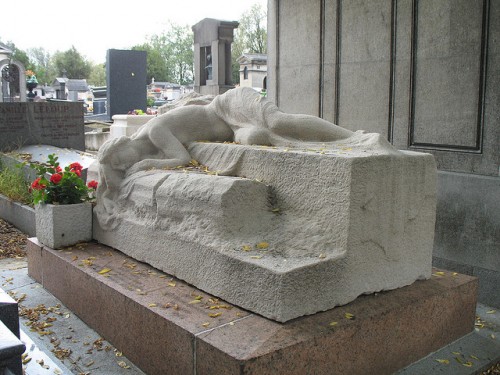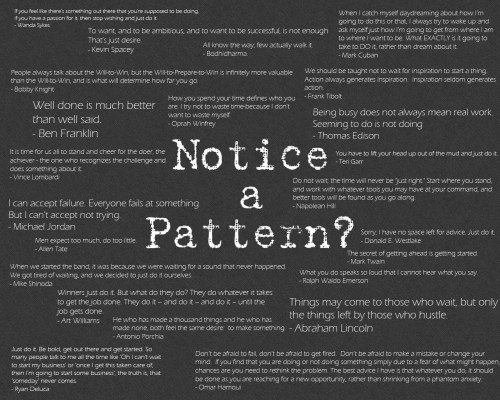
#1 Dying Regret: Not Having The Courage To Live True To Yourself
My first job out of college was working for Hallmark Cards. One of the things that became readily apparent from the beginning was that if you stayed with the company, you were going to leave with well over $1 million at retirement. I also began to see that because of this, there were more than a few people that were stuck doing a job that they didn’t really enjoy, but had convinced themselves they couldn’t afford to leave.
When I decided to leave a couple of years later, it happened to be during a difficult economic time and I had no other job lined up. There were quite a few people that said I was crazy to leave such a secure job. Most couldn’t understand why I was willing to leave just because I didn’t enjoy being there. I ended up quitting, traveling to Alaska with the goal of making my way all the way to the southern most point of South America. I made it to Central America before another adventure interrupted that plan and I found myself in the middle of the countryside of Japan.
It was a difficult decision and there was a lot of pressure not only from acquaintances, but also friends, to stick with the Hallmark job for the security. I have never regretted the decision to leave or to pursue the things that make me happiest no matter what others may say. I know that I have disappointed others with my decisions from time to time, but I can safely say that not having the courage to live true to myself will not be one of my dying regrets.
While this may not seem like something that has much to do with money, for me it certainly has over the years. The reason that I have been able to summon the courage to do many of the things that I have done is because I know I can survive on very little money and still be happy. I know myself well and if I lost all of my possessions tomorrow, I wouldn’t be happy about it, but it wouldn’t be devastating either. Knowing that I can survive happily on very little makes it much easier to take chances that others would be more reluctant to take. Being debt free and confident in your finances (no matter how meager) goes a long way to help gain the courage to be true to yourself.
#2 Dying Regret: Having Worked Too Hard
I think that this regret needs to be qualified. I work hard. Really hard. Some people would say that I work too hard, but I work hard at something that I truly enjoy. I also don’t work to the detriment of other things that I would like to be doing. In fact, I have created it so that my work includes doing some of my favorite things. For example, I enjoy hiking, exploring and being outdoors. So as part of my work, I now visit as many National Parks as I can each year and write about them. If hiking all day in some of the most beautiful places in the U.S. constitutes having worked too hard, then I plead guilty as charged.
It’s not the working hard that I think that most people regret, but it’s spending too much time at work (and other activities) that they didn’t really enjoy to the detriment of relationships and other important things in their lives. This is illustrated by Ware who writes, “All of the men I nursed deeply regretted spending so much of their lives on the treadmill of a work existence.”
Again, this may not seem like it’s money related, but often the excuse for working all those hours is to earn more money (ironically so that you can do the things that you really enjoy). By understanding how much money I need to do the things that I want to do most and not having to try to create any more wealth than that, I feel secure that having worked too hard (at things I didn’t enjoy) will not be on my list of dying regrets.
#3 Dying Regret: The Courage To Better Express Your Feelings
This is probably the closest regret I may have that is on this top five list, but not for the reasons that others do. Ware says that this regret comes from those that ended up settling for mediocrity (with many developing illness from the bitterness and resentment) from not expressing their true feelings to others and failing to become what they believed they could be. I have never felt that I was unable to express my feelings in this way to any of my family or friends.
I’m not sure how financial related this regret is, but I have the feeling that both emotional and financial dependence have a role to play with this regret. I think that those who are financially stable and can remain so on their own are in a position that makes it easier for them to express their true feelings than those that are dependent on others.
Where I think I do fail is letting those close to me know how much I love and care for them. I tend to assume that those around me know that by me choosing to spend my time with them, this means that they are special people in my life. I’m not sure this is always a good assumption to make and I know that I could (and will continue to work on) letting those that I care about know how much I truly do value them. Seeing this regret has been a good reminder that I need work harder on this.
#4 Dying Regret: Stayed In Better Touch With Friends
I don’t think that Ware could have summed it up better than the line “Everyone misses their friends when they are dying.” This is one of the potential regrets that I am actively working on today to make sure that it doesn’t turn into a regret when I am dying.
I spent nearly 15 years in Japan, and although I did make friends there, I lost contact with a lot of my good friends in the US while I was gone. When I returned back to the US, I made the conscious decision to not purchase a home even though I could afford one. Instead, I decided to be a digital nomad and travel full time. One of the many benefits of doing this is that I am able to visit and catch up on old friendships and spend a lot more time with my family than I would have ever been able to if I owned a home. Most people can’t leave their job without a fair amount of planning, but most can welcome someone who happens to be visiting the area where they live. I have chosen to be a person that can easily be the person visiting.
Although I haven’t reached the point where I would feel that this wouldn’t be a regret at all if I were to die in the near future, I do believe I continue to make a great effort in this area to the extent that this will not be on my regret list when my time does come. I also feel that I was able to set this potential regret on the correct path by having my finances in order and knowing how I wanted to spend the money I had versus taking the typical financial advice of buying a home.
#5 Dying Regret: To Let Yourself Be Happier
The author says, “Many did not realise until the end that happiness is a choice.” I don’t think that this can be overstated and the earlier that one learns this, the better. The problem that I often see is that there are still so many people that believe that money will buy them happiness. The truth is (even though it is difficult for many to comprehend) that making $250,000 a year won’t make you any happier than making $75,000 a year. While $75,000 is the mark for most people, it’s actually a lot less for me (but I have always been strange in that way).
I become more and more convinced that many people never take the time to really figure out what makes them happy, and if you don’t know what makes you happy, it is difficult to find that happiness. I learned long ago that things don’t make me nearly as happy as experiences. I spend almost all of my income toward gaining more experiences rather than gathering more things. This is the opposite of most people I know, and while some things may bring some people happiness, I can say with a good amount of confidence that what the advertisers say will bring you happiness and what really will bring you happiness are probably not the same.
Understanding what makes you happy will greatly influence your finances. First, and foremost, you can stop spending your money on things that the advertisers say are supposed to make you happy, but really don’t. Surprisingly to most, it also often shows that you don’t need nearly as much money as you thought to be happy. Above all else, it gives you a solid goal to go after that is what you really should be striving toward.
Final Thoughts
Just because I don’t plan to have any of the top 5 dying regrets when my life comes to an end doesn’t mean that I am anywhere near finished when it comes to making sure that they aren’t regrets. I think that it takes constant vigilance to be true to yourself and to live a life the way that brings happiness and few regrets. One of the best reasons to get your finances in order is that doing so makes these challenges so much easier to accomplish so that you do have fewer regrets during life.
You now know the top 5 regrets for the vast majority of people as they near death. What are you going to do starting today to make sure that none of these are on your list?

Jeffrey strain is a freelance author, his work has appeared at The Street.com and seekingalpha.com. In addition to having authored thousands of articles, Jeffrey is a former resident of Japan, former owner of Savingadvice.com and a professional digital nomad.
Comments